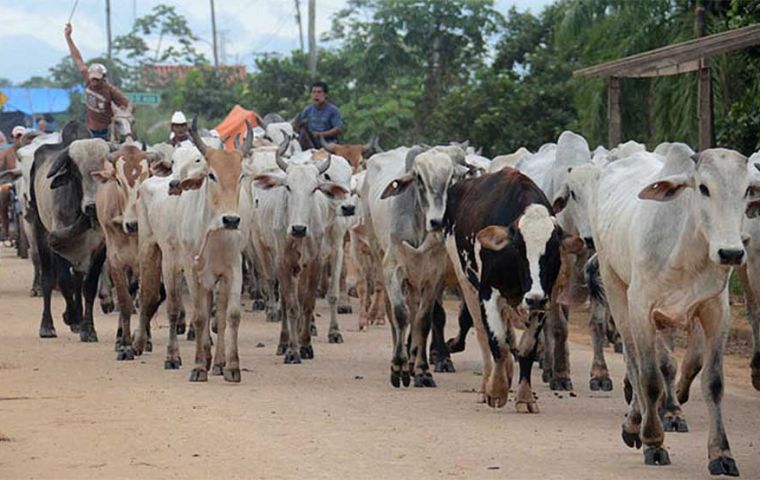
LA PAZ, Feb 8 (NNN-MERCOPRESS) — The Bolivian government’s ban on beef exports represents daily losses of approximately US$ 500,000 for the country’s cattle farmers, warned the National Chamber of Exporters of Bolivia (Caneb).
The suspension was announced by Productive Development Minister Néstor Huanca, citing the need to regulate supply and reduce the price of meat in the domestic market.
“The Caneb is in an emergency, we join the concern that affects mainly the cattlemen of the east. We do not understand the actions of the Government; I think we have worked to improve exports, we were on the right track, but I want to be clear the affectation will be for more than US$ 500,000 per day,” Caneb Manager Marcelo Olguín explained.
He also noted that, in 2024, meat exports yielded US$ 185 million, an improvement from 2023’s US$ 136 million. “There was a growth of US$ 40 million considering that there have been strikes, blockades; we have faced fuel supply problems, lack of dollars.”
“The meat sector is one of the country’s potentials and we cannot go backward. Our economy risks not receiving over US$ 200 million when we need dollars the most,” he insisted.
“The Government has to understand that there are issues that do not correspond to the productive apparatus and are structural issues, we have always been open to dialogue, but cuts are made as yesterday and damage the image of the country and we may lose important markets such as the Chinese,” he explained.
“It is a measure that goes against production, against all this effort that the livestock sector is making to export meat, to bring foreign currency that the country needs to have dollars and to try to balance the Bolivian economy,” said the Agricultural Chamber of the East (Cámara Agropecuaria del Oriente – CAO) Acting President Klaus Frerking.
On the other hand, Economy Minister Marcelo Montenegro said there would be no objections to resuming exports once local retail prices are stabilized. “If the price of meat is normalized, there is no problem, they can continue exporting. But as long as the problem exists, the domestic market is preserved, that is the position of a Government that takes care of the pocket of the population,” he stressed.
Vice-Minister of Agricultural Development Álvaro Mollinedo also explained that the decision to halt beef exports sought to prioritize food safety for the local population.
”Every time (meat producers) want to make the meat go up more, the price has reached between 60 to 65 bolivianos per kilo and tends to rise, even a little more (.). Likewise, there is less supply of meat in the different markets and also less supply of live cattle in the different distribution points (slaughterhouses),” lamented Mollinedo while pointing fingers at private producers such as the Confederation of Bolivian Cattlemen (Congabol), the Federation of Cattlemen of Beni (Fegabeni) and the Federation of Cattlemen of Santa Cruz (Fegasacruz). — NNN-MERCOPRESS






